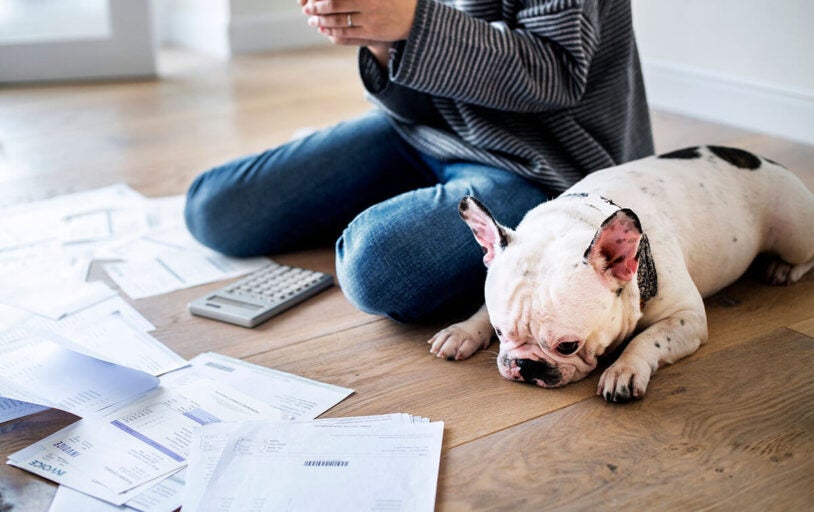
Using Personal Loans For Debt Consolidation
8/31/2023

If you have high-interest debt, like credit card debt, the payments and emotional weight of trying to pay it off can be overwhelming. With minimum payments barely covering the high-interest rates, it may feel hard to get ahead. But it doesn’t have to be.
You can use a personal loan for almost anything—from financing a vacation, paying for a wedding, helping with moving costs, or making a major purchase–—but consolidating and/or lowering high-interest debt is one of the most popular uses.
Whether you have one bill or several, paying off your high-interest debt with a fixed, low-interest personal loan may reduce the burden and save you money. Using a personal loan to pay off debt is commonly referred to as a debt consolidation loan because of how they allow you to consolidate into a single loan.
Apply for a personal loan with Arkansas Federal Credit Union today and learn more about how we can help you consolidate your debt.
What’s a Personal Loan?
A personal loan allows you to get a specific amount of money in one lump sum that can be used for almost anything. You then repay the personal loan in monthly installments. The monthly payments include equal portions of the original loan amount plus interest, so you’ll always know what your monthly payment will be.
Consolidating your debts under a personal loan can help you get out of debt faster by creating a specific timeline for paying off your debt and lowering the total you’ll pay over time. With all your debt consolidated under one personal loan, you’ll have one simple monthly payment with a set payment period that will typically have a lower interest rate.
How Do Personal Loans Work?
The first step in getting a personal loan is to fill out an application for your lender to review. After you’re approved for your personal loan, the money will be deposited into your bank account in a lump sum payment. The money from a personal loan can be used for whatever you’d like unless the terms of your loan state otherwise.
You will have a specific monthly payment amount set to repay your personal loan. You can pay more than the minimum payment amount if you want. However, before you start paying off your loan early, it’s important to make sure there’s no penalty fee for paying off the loan sooner than the original term. Most lenders don’t have an early repayment fee, but there are some who do.
Personal loans have an interest rate you will pay each month, but it’s usually a lot lower than the interest rate on credit cards. With a lower interest rate, you’ll pay less throughout the life of your debt and save money over time.
Another benefit of using personal loans to consolidate debt is the positive impact on your credit score. Making your personal loan payments on time and in full each month can help you increase your overall credit score. Your lender will report these payments to the credit bureaus every month about your reliability.
Consolidating debt with a personal loan can help you improve your credit score. With a personal loan, if you can make consistent payments to decrease your debt, you can build a positive payment history which can help improve your credit score. Paying off your debts can also help reduce your credit utilization ratio, which is the amount of credit that you have in use. The less of your available credit that you use, the better your credit.
How Can You Consolidate Debt With a Personal Loan?
If you have credit card debt or other high-interest debt, there are a variety of ways you can consolidate your debt. A personal loan is one of the easiest ways to consolidate your debt. You can use the lump sum payment you receive from a personal loan to pay off your high-interest debt from multiple sources. With your debts paid off, you are left with a single, lower-interest payment to your personal loan.
The process is as simple as applying and being approved for a personal loan that totals the amount of all your outstanding debts you’d like to consolidate. Once your loan is disbursed into your bank account, you contact each debt you’d like to consolidate to pay off the debt in full. With all of the outstanding debts paid off, you’re left with one monthly payment for your personal loan.
Benefits of Consolidating Debt With a Personal Loan
Consolidating debt under a personal loan can offer a variety of benefits, such as helping you to simplify your debt payments while reducing your interest payments.
Lower Interest Rate
You can use a personal loan to pay off higher-interest debts. Typically, personal loan interest rates will be lower than the interest rate on credit cards or your original debt payments, so you will save money on interest charges while paying off your debt.
Fixed Rate
When using a personal loan for debt consolidation, you can rest assured that your personal loan rate will stay the same. There aren’t introductory rates or rate changes that are common with credit cards, so you know exactly what you’ll be paying each month. Your monthly payment will stay the same throughout the life of your loan.
Short Terms
Personal loans come with specific term lengths to pay off the loan. A typical personal loan is 1 to 5 years. You’ll be able to have a shorter and more specific timeline in mind when paying off your debts.
Simplified Payments
Keeping track of all the different payment dates and amounts can be difficult if you have several debts. When taking out a personal loan, you can use the lump sum payment to pay off all your debts and easily manage your budget by making one payment instead of several to different lenders and creditors. Not only is paying off one singular debt less stressful, but it also makes you less likely to accidentally miss a payment.
Improved Credit Score
Paying off high-interest debt with a personal loan could help improve your overall credit score. Having fewer lines of debt could reduce your debt-to-income ratio, which is the amount of credit you’re using, and improve your credit score.
Things to consider with a Personal Loan
Even though a personal loan can consolidate and move your debt, the debt still exists. If your goal is to get out of high-interest debt, a personal loan from a reputable lender can be a great option, but you must also stay away from those high-interest credit cards in order for this to be a smart move.
Using a personal loan to consolidate your debt may improve your credit score and allow you to take out more lines of credit. You will have to be careful not to take out any other high-interest debt that may stop you from being able to pay off your personal loan.
One disadvantage of using a personal loan for debt consolidation is that getting approved for a personal loan can be difficult. You could be ineligible for a personal loan if you have a low or bad credit score, a thin credit history, or a high debt-to-income ratio. Multiple recent credit checks or an inability to prove stable income could also make getting a personal loan difficult or even impossible.
Steps to Successful Debt Consolidation with a Personal Loan
There are a few important steps to follow to make sure that your personal loan debt consolidation is as successful as possible.
Before applying for a personal loan, you should determine the total amount of debt by summing up your existing debts to know the amount of debt you need to consolidate. By totaling your debt, you can be sure that your personal loan is large enough to consolidate all your debts.
Exploring different lenders and rates can help your personal loan debt consolidation be as successful as possible. Look at a few different lenders to learn about competitive rates and loan terms. Arkansas Federal offers personal loans with competitive rates to help you get the money you need faster and at a lower cost.
Apply for a Personal Loan Today
Using a personal loan to pay off high-interest credit card debt, or other debts, is a way of moving your money around for a more favorable interest rate and/or term. A personal loan may be a good option if you have a lot of high-interest debt that you would like to consolidate into a single payment with a lower interest rate.
Arkansas Federal offers personal loans with varying amounts and competitive rates. You can apply online today to start the process of paying off your high-interest debt.
If you are interested in a low-rate credit card with Arkansas Federal, you can apply online, visit one of our local branches, or call us at (800) 456-3000 to get started.
Related Resources
-
Read Using A Personal Loan For Home Improvement Projects 
-
Read Personal Loans For College Tuition 
Personal Loans For College Tuition
-
Read Debt Consolidation Options 
Debt Consolidation Options

